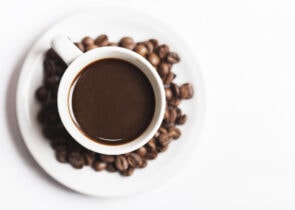Ever had a few cups of coffee and felt like your heart was beating faster, or worse, some chest pain? As a coffee professional, I’ve certainly had my fair share of palpitations during extended tasting sessions. There’s a reason some people get chest discomfort with coffee, and it might not be what you think!
As it is, caffeine, the active ingredient in coffee, doesn’t typically cause any heart problems, nor chest pains for that matter. That is especially the case if you consume safe levels of caffeine every day — about 400mg.
Let’s talk about what’s happening to your body when you drink coffee and what could be causing the pain.
Recommended: The Pros and Cons of Coffee

Key Takeaways
- Contrary to some concerns, caffeine generally doesn’t lead to heart-related problems or chest pains, as long as intake stays within the recommended 400mg limit per day.
- Chest pain often attributed to coffee may be due to acid reflux or a heightened sensitivity to caffeine, which can affect the heart’s blood flow.
- Certain individuals, including pregnant and breastfeeding women, children, and those with specific health conditions, should be cautious with caffeine, especially in combination with some over-the-counter medications that can intensify side effects.
How Caffeine Affects Your Heart and Body
Many of us rely on coffee every morning to be our daily pick-me-up to get us going. Coffee stimulates our CNS (Central Nervous System), making us feel like we have the energy to tackle the world.
What’s not so well-known is that coffee also encourages increased secretion of stomach acid, increases your blood pressure, and causes an increase in heart rate. People with caffeine sensitivity may experience adverse side effects of caffeine.
If the heart beats fast enough and the blood pressure goes up high enough, it could discourage blood flow to the heart, causing chest pains. This isn’t the case for most people who drink coffee, and if you don’t have caffeine sensitivity but get chest pains after coffee, it’s more likely to be acid reflux.
The American Heart Association says that coffee has plenty of antioxidants, which are great for your skin and body as well. Coffee also has the potential to reduce the risk of heart disease.
How Much Caffeine Is Too Much?
As mentioned, a healthy person can safely tolerate 400 milligrams of caffeine (more or less). That’s equal to about four cups of coffee and is considered moderate caffeine consumption, according to the Mayo Clinic. It is important to note that excess caffeine intake can still affect your body negatively in other ways.
Here are some of the unpleasant symptoms that can be caused by drinking large amounts of caffeine regularly:
- Tremors
- Headaches
- Heartburn
- Insomnia
- Irritability
- Nervousness
- Rapid heart rate
- Frequent urination
The amount of coffee that produces these troublesome symptoms will vary from person to person, depending on their tolerance to caffeine.
One individual could drink less than 400mg of coffee per day and experience these symptoms, while the next person who may or may not have a sensitivity can go over this amount and be completely fine.
It’s important to pay attention to your body and how it responds when you drink a certain amount of coffee or caffeinated beverages in general. Consult a physician should you experience difficulty breathing or persistent chest pains.
Is Caffeine Dangerous for Some People?
Aside from those with caffeine intolerance, other vulnerable groups of people also shouldn’t drink coffee for various reasons.
The intake of caffeine increases your body’s production of the stress hormone cortisol. This hormone triggers the fight or flight response when there’s a perceived threat or intense ordeal.
Cortisol gets secreted by the adrenal glands when stimulated by both the pituitary and hypothalamus glands. Cortisol suppresses other bodily functions to elicit a swift response to danger and stress.
When combined with specific medications, caffeine is more likely to cause elevated blood pressure or heart palpitations. You should avoid caffeine sources like coffee and energy drinks when using over-the-counter decongestants that contain ephedrine or drugs that contain theophylline and echinacea.
This combination of substances can also cause unpleasant caffeine side effects.
Below is a list of people with conditions that may need to limit or avoid caffeine altogether:
- People who have insomnia
- Women who are pregnant or breastfeeding
- Kids and teenagers
- People who have ulcer disease or acid reflux symptoms
- People who have anxiety
How Far Are You From the Limit
Just how far are you from the recommended daily limit of 400mg? That depends on the type of coffee and serving size. Take a look at this chart for a ballpark figure of how much coffee you should be consuming.
| Type of Coffee | Serving Size | Caffeine Content | How Many Cups You Should Drink |
|---|---|---|---|
| Espresso (double shot) | 59.2ml | 126mg | 3 |
| Latte (double shot) | 59.2ml + milk | 126mg | 3 |
| Brewed filter coffee | 240ml | 96mg | 4 |
| Nespresso | 40ml | 65mg | 6 |
| Instant coffee | 2 teaspoons, dissolved in water | 63mg | 6 |
| Decaf coffee | 240ml | 2mg | technically 200, but don't! |
Conclusion
In general, daily caffeine intake should never cause any form of chest pain. However, if you happen to have chest pain after having caffeine, it could be that you have caffeine sensitivity.
Remember that this is common with people not accustomed to having any form of caffeine. If you’re one of these people, you should avoid caffeine altogether.
Keep in mind that there is a list of people who should avoid caffeine because of preexisting conditions, such as pregnant and breastfeeding women, people with insomnia, and even children and teenagers.
Finally, keep an eye out for certain over-the-counter medications that can make for a terrible experience when mixed with caffeine, such as ephedrine.
If you have any persisting pain, chest tightness, or discomfort, don’t hesitate to see a doctor immediately.
Happy (painless) Caffeinating!







